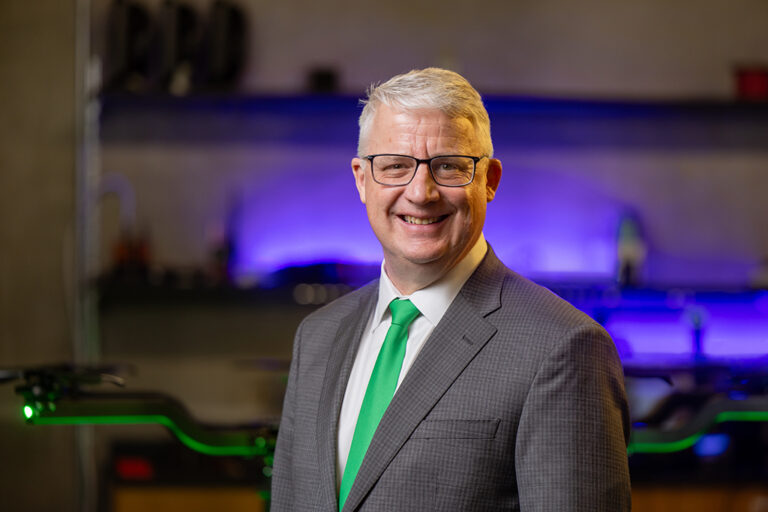Tackling global challenges of mental & physical health
UND researchers win federal grants to study anxiety disorders, waste-stream pollution

Two UND researchers have been awarded significant federal grants to work on topics of worldwide concern.
Saobo Lei, Ph.D., professor in the UND School of Medicine & Health Sciences Department of Biomedical Sciences, has been awarded a five-year, $1.5 million grant from the National Institutes of Health.
The prestigious R01 class grant, which is funded through the National Institute of Mental Health, will be used to explore new therapies for anxiety disorders in humans.
And UND Assistant Professor of Civil Engineering Feng “Frank” Xiao has been named one of only three researchers in the country to receive a highly competitive Early Career Award from the U.S. Environmental Protection Agency’s (EPA) STAR program to address a key national health-pollution issue.
The award is for approximately $500,000 over three years. Xiao will use it to analyze the impact of a class of pollutants called PFAS on the human body.
Anxiety disorders research
Anxiety disorders are among the most common psychiatric disorders, affecting as many as 20 million American people today. Unfortunately, current first-line pharmaceutical treatments for anxiety are effective for only 50 to 60 percent of patients, and achieve full remission of anxiety in less than one-third of people taking them.

Furthermore, most available medications, such as the class of pharmaceuticals known as benzodiazepines, have side effects and can create dependence in users.
Having studied anxiety and related neurological conditions for more than a decade, Dr. Lei is hoping his lab might discover a new way of treating or preventing such disorders.
“Our long-term goal with this grant is to explore novel mechanisms by which therapeutic strategies for anxiety disorders can be developed,” noted Dr. Lei. “Accumulating evidence indicates an important role for vasopressin, or AVP, in anxiety. Among other effects, AVP interacts with a class of receptors known as V1aRs that, when activated, contribute to the symptoms of what we call anxiety.”
While the roles of V1aRs in anxiety have been established, the ways and means by which activation of these receptors exert anxiety-inducing effects have not been determined, said Lei. The objective of this proposal is to determine those ways and means.
“This research is innovative because it will define the cellular and molecular mechanisms whereby V1aR activation contributes to anxiety,” Lei concluded. “Understanding these would stimulate the development and uses of drugs targeting V1aRs for the treatment of anxiety.”
Research reported in this publication was supported by the National Institute of Mental Health of the National Institutes of Health under Award Number R01MH118258. The content is solely the responsibility of the authors and does not necessarily represent the official views of the National Institutes of Health.
‘PFAS in the waste stream’ research
The EPA, as part of its STAR program (Science to Achieve Results), sought proposals to analyze and treat a class of contaminants called PFAS in the waste stream. PFAS (per- and polyfluoroalkyl substances) are a group of human-made chemicals that have been used for decades in many products including nonstick cookware, fast-food wrappers, stain-resistant sprays and certain types of firefighting foam.

Most people have been exposed to PFAS, and some of the compounds can accumulate and stay in the human body for long periods of time. Moreover, there is evidence that exposure to PFAS can lead to adverse health outcomes in humans, the EPA reports.
The EPA received 32 applications from around the country for its Early Career research grants on this topic. Three grants were awarded, including Xiao’s.
“It is a great honor,” Xiao said about the news. “I feel thrilled that the EPA liked my proposal and scientific value and practical importance of my idea.”
“I also feel grateful for all the help and support that I have received from my department, college and the university as a whole, especially the faculty early career award and pilot postdoctoral award from the Office of Vice President for Research & Economic Development,” he said.
Xiao joined the UND’s Civil Engineering Department in 2015. He earned bachelor’s and master’s degrees from Harbin Institute of Technology in China and a doctorate from the University of Minnesota, all in Civil/Environmental Engineering. This is his second federal award in this year.
More information about Xiao’s research group can be found on this website: https://sites.google.com/site/fengfrankxiaound/.



